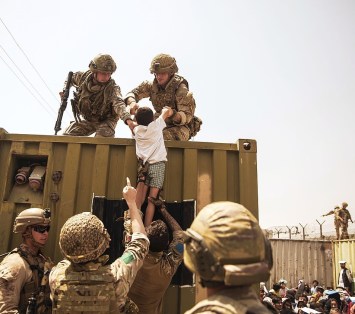
Michael Venutolo-Mantovani has written a riveting piece for the October 2022 issue of Wired, “Just One More.” Late on the night of August 15, 2021, Worth Parker’s North Carolina cell phone received a Facebook message about the chaos in Afghanistan. It read: “Sir. I hope you are well. By any chance do you know any Marines who are on the ground right now?” Having retired from the US Marines as a Lt. Colonel six weeks before, Parker thought he’d cut those ties.
The message described the plight of the sender’s brother and father who had both worked for the US military in Afghanistan. With the American pullout scheduled for the end of the month, their lives were in increasing peril. The sender, Jason Essazay, had also worked for the US, but had obtained a Special Immigrant Visa for his service and was living in Houston. “Parker was Essazay’s last resort,” Venutolo-Mantovani writes. At the time the pullout was announced, 81,000 Afghans had pending applications for a SIV. US intelligence reports predicted it would take several months for the Taliban to take Kabul, but as we now know, the fall of Kabul occurred only days later.
When Parker read that the 24th Marine Expeditionary Unit was helping with the evacuation, he called an old friend in the unit who said he’d try to help. Working in the eye of a fast-moving hurricane of fragmentary information, changing requirements, and coordination difficulties involving violent extremists and desperate families, Parker’s initiative succeeded.
Three days before Essazay’s contact with Parker, Joe Saboe, who’d left the Army 20 years earlier received a call from his younger brother, wanting help to get a friend and his family out of Afghanistan. Saboe didn’t know how he could help, but “tried the closest thing to a Noncombatant Evacuation Operations tool he had: Facebook. His post asking for help generated a message from a friend of twenty years before also trying to rescue someone. The two men strategized. Soon he heard from more veterans, each worried about a single contact. By August 17, Saboe had a group of volunteers working on the cases of 128 potential evacuees. A story in the Military Times generated more than a thousand contacts from Afghans looking for help and Americans wanting to provide it.
Parker, the former Lt. Colonel, enlisted his high-powered connections in the military establishment to form a group calling itself “the Graybeards.” Learning about Saboe’s operation, Parker hoped to convince Saboe’s volunteers to support the Graybeards’ efforts. “But almost immediately, Parker realized (the younger generation) was comically more tech savvy” than the retired military and civilian leaders. “It was time to reject the chain of command that had been drilled into him from the minute he joined the Marines.” He put the Graybeards’ Project Dunkirk in direct support of Saboe, giving him “some of the best-connected people in the US military and intelligence worlds.”
Heroic efforts were made in a fluid and increasingly dangerous Kabul. They achieved the rescue of more than 1,500 Afghans and, even today, more people continue to be evacuated in ones and twos. Each is a victory, but, collectively, they represent only five percent of Saboe’s database. Volunteers continue to chip away at that list, trying to save, as Project Dunkirk’s motto has it, “Just one more.” This whole inspiring and infuriating article is well worth a read.

The way that whole thing was handled by our government was abominable. It will go down as one of the worst disgraces in American history. Another sad fact is that despite the loss of lives by our military, and the fact that we left Americans behind as well as those Afghans who helped us, no one has been held accountable for mishandling this shameful situation. I’ve dedicated my forthcoming book to those marines, soldier, and sailor who lost their lives and to those who sustained injuries as well.